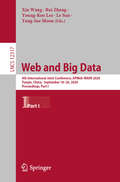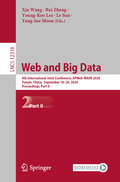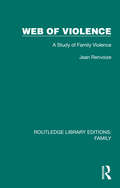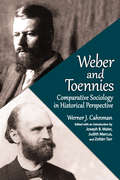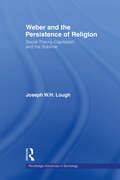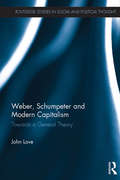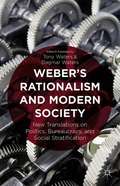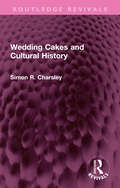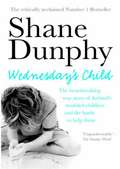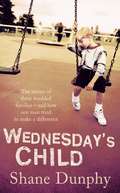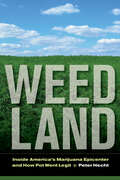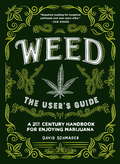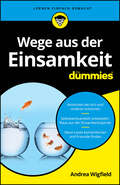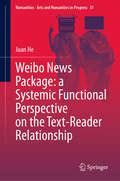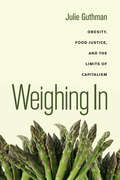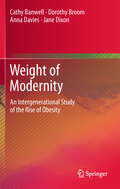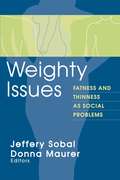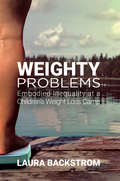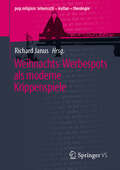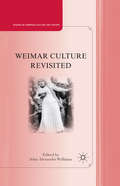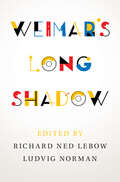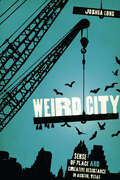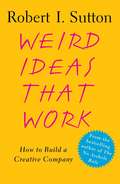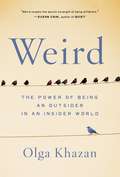- Table View
- List View
Web and Big Data: 4th International Joint Conference, APWeb-WAIM 2020, Tianjin, China, September 18-20, 2020, Proceedings, Part I (Lecture Notes in Computer Science #12317)
by Xin Wang Le Sun Yang-Sae Moon Rui Zhang Young-Koo LeeThis two-volume set, LNCS 11317 and 12318, constitutes the thoroughly refereed proceedings of the 4th International Joint Conference, APWeb-WAIM 2020, held in Tianjin, China, in September 2020. Due to the COVID-19 pandemic the conference was organizedas a fully online conference. The 42 full papers presented together with 17 short papers, and 6 demonstration papers were carefully reviewed and selected from 180 submissions. The papers are organized around the following topics: Big Data Analytics; Graph Data and Social Networks; Knowledge Graph; Recommender Systems; Information Extraction and Retrieval; Machine Learning; Blockchain; Data Mining; Text Analysis and Mining; Spatial, Temporal and Multimedia Databases; Database Systems; and Demo.
Web and Big Data: 4th International Joint Conference, APWeb-WAIM 2020, Tianjin, China, September 18-20, 2020, Proceedings, Part II (Lecture Notes in Computer Science #12318)
by Xin Wang Le Sun Yang-Sae Moon Rui Zhang Young-Koo LeeThis two-volume set, LNCS 11317 and 12318, constitutes the thoroughly refereed proceedings of the 4th International Joint Conference, APWeb-WAIM 2020, held in Tianjin, China, in September 2020. Due to the COVID-19 pandemic the conference was organizedas a fully online conference. The 42 full papers presented together with 17 short papers, and 6 demonstration papers were carefully reviewed and selected from 180 submissions. The papers are organized around the following topics: Big Data Analytics; Graph Data and Social Networks; Knowledge Graph; Recommender Systems; Information Extraction and Retrieval; Machine Learning; Blockchain; Data Mining; Text Analysis and Mining; Spatial, Temporal and Multimedia Databases; Database Systems; and Demo.
Web of Violence: A Study of Family Violence (Routledge Library Editions: Family)
by Jean RenvoizeSome of the most frightening and harmful violence in modern society takes place inside the family. Wives, children, grandparents, all of them can be subject to attacks that range from mild ‘roughing up’ to assaults that leave the victim physically or psychologically crippled. What causes this violence? What sort of people are the attackers and the victims? What can we do to diminish it and to help those who suffer? Originally published in 1978, Jean Renvoize author of the highly praised Children in Danger traces the web of violence along many different strands. She covers baby battering and child abuse, violent husbands and wives, ‘granny bashing’ and incest. She looks at the psychological roots and the social patterns; she also surveys the agencies that act to prevent family violence, from social workers and those who run refuges to police and doctors. She suggests a number of positive steps that could and should be taken to improve society’s response. As in Children in Danger, she draws on many first-hand sources of information, not only professionals working in the field but also the detailed and intimate self-revelations of both victims and batterers. The first chapter – an almost unbelievable account by a girl caught up in four generations of violence, whose sufferings make her recoil from it and yet at the same time draw her inexorably deeper in, both as victim and aggressor – is the first of many case histories on which Jean Renvoize draws. Her book is an extraordinary document about humanity, as well as an essential guide for anyone who has to deal with the problems it discusses with such insight and objectivity.
Weber and Toennies: Comparative Sociology in Historical Perspective
by Werner J. Cahnman Joseph B. Maier Judith Marcus Zoltán TarrThis collection of selected essays by Werner J. Cahnman brings together out of scattered dispersion his writings about Max Weber, Ferdinand Toennies, and historical sociology. The great theoretical range and depth of his intellect and mastery of sociological thinking is apparent as he discusses the impact of romanticism on modern thought, and how Weber and Toennies both analyzed and reacted to modernity.Cahnman places Weber (1864-1920), the dominant figure in twentieth-century sociology, in the midst of the methodological controversies so characteristic of contemporary social science, and he fully discusses the overarching importance of Weberian ideal-type theory. Although less well-known than Weber, Toennies (1855-1936) was also a sociologist of the first rank. He is best remembered for his enormously influential twin concepts, Gemeinschaft and Gesellschaft, which contributed to our understanding of the historical and sociological basis for the change from premodern to modern societies. The essays in this volume establish Toennies' intellectual connections to Karl Marx, Max Weber, Emile Durkheim, and Herbert Spencer, and clarify his influence upon American sociology.Cahnman stood against strict separations between history and sociology, and his essays are all informed by a wonderful admixture of the theoretical and the concrete. They demonstrate how a genuine historical sociology, not unlike that of Weber and Toennies, can find and explain linkages between seemingly disparate events spanning time and place. This volume will be of interest to sociologists, political scientists, and intellectual historians.
Weber and the Persistence of Religion: Social Theory, Capitalism and the Sublime (Routledge Advances in Sociology)
by Joseph W. LoughThere is an increasing interest in religion and belief and the diverse forms these take in the contemporary world. This timely book provides a unique analysis of these issues through a discussion of the work of Marx and Weber. Taking Max Weber’s interpretations of capitalism and religion as its point of departure, Weber and the Persistence of Religion re-examines a wide range of classical and contemporary texts, including Immanuel Kant, Foucault and Jean Baudrillard, to help explain the peculiar character of religion and spirituality in mature capitalist societies. This book shows how the peculiar disembodied character of contemporary spirituality and religion, along with the disenchanted character of public life, may be formally related to the increasingly disembodied, immaterial character of value in capitalist societies. It will be of interest to students and scholars of Social Theory, History, the Sociology of Religion and Philosophy.
Weber, Schumpeter and Modern Capitalism: Towards a General Theory (Routledge Studies in Social and Political Thought)
by John LoveThis book provides the groundwork for a general theory of modern capitalism by reinterpreting Max Weber’s work on the origins and institutional underpinnings of modern capitalism, and Joseph Schumpeter’s thought on the mechanisms and functioning of the capitalist economy. Focusing on the lesser-known works of both figures, particularly in the case of Weber, whose writings on economics and economic history are frequently overlooked, the author contends that a combination of Schumpeter’s and Weber’s theoretical schemas, incorporating their many valuable insights, provides the basis of a unified, overall theory of modern capitalism that is comprehensive, coherent and persuasive. With attention to the important theoretical connections between Weber and Schumpeter and the respective contributions of both with regard to the nature and workings of capitalism, the author explores the compatibility of the two approaches, arguing that the full significance of the contributions of the two writers has not been adequately appreciated. A systematic and sympathetic comparison and synthesis of the contributions of two of the central figures in social and economic theory, which highlights the enduring relevance of their work in times of political and economic crisis, Weber, Schumpeter and Modern Capitalism will appeal to scholars across the social sciences with interests in social and economic theory, classical sociology and economic history.
Weber’s Rationalism and Modern Society
by Tony Waters Dagmar WatersWeber's Rationalism and Modern Society rediscovers Max Weber for the twenty-first century. Tony and Dagmar Waters' translation of Weber's works highlights his contributions to the social sciences and politics, credited with highlighting concepts such as "iron cage," "bureaucracy," "bureaucratization," "rationalization," "charisma," and the role of the "work ethic" in ordering modern labor markets. Outlining the relationship between community (Gemeinschaft), and market society (Gesellschaft), the issues of social stratification, power, politics, and modernity resonate just as loudly today as they did for Weber during the early twentieth century.
Wedding Cakes and Cultural History (Routledge Revivals)
by Simon CharsleyFirst published in 1992, Wedding Cakes and Cultural History is a unique contribution to the anthropology of food, tracing the fascinating history of wedding cakes, from late medieval feasts and rites, through the Victorian wedding breakfast and into the 1990s. Dr. Charsley maps the intricate creation of the wedding cake and explores its uses and meanings. He shows that the wedding cake provides a vivid illustration of the traditions and traditional values inherent in all foods and demonstrates the part that material culture plays in the process of change. Challenging in its ideas, yet approachable in style and subject matter, this book will be of great interest to students and teachers of anthropology, sociology and cultural studies.
Wednesday's Child
by Shane DunphyShane Dunphy was involved in social care for fifteen years. This book is a distilling of the cases he encountered in that time to make a single, year-long narrative. Apart from that compression, and some necessary changes of identifying details, everything in this book is true. And what the truth reveals! Here are the cases of three dysfunctional families, struggling at the margins of scoiety that barely acknowledges the existence of such people. This is a portrait of fatalistic despair, of families so sunk into chronic poverty and neglect that they are beyond saving themselves or their children. All the elements of social dysfunction are present: the unkempt houses, truant children, endless television, anorexia, alcoholism, suicidal depression. Yet out of this mess there is hope as well as tragedy. Most of Wednesday's children don't make it, but some do. Some survive the most appalling childhood horrors to make it through to the normal adult world. But more are doomed. Despite the heroism of child protection workers and the best efforts of well-intentioned people, we still face a hidden mountain of avoidable human misery. Wednesday's Child is shocking and disturbing. And most of all, true. In three amazing stories childcare worker Shane Dunphy reveals a world of hidden heartbreak and survival against the odds. When Shane meets her, Gillian is starving herself to death and in thrall to a mother more interested in abusing and manipulating her daughter than cherishing and protecting her. Though he tries to help, it seems Shane is just another adult destined to fail Gillian . . . For the daughter of disturbed violent parents, Connie is an amazingly well-adjusted A-grade student. But when Shane finally gets behind the facade, he unearths a shattering truth behind her apparent normality. . . Cordelia, Victor and Ibar are three loving siblings left with a hopelessly alcoholic neglectful father. It's a race against time to see if their father can ever become the kind of Dad he wants to be, or if they are destined to be split up and sucked into the childcare merry-go-round. . .
Wednesday's Child
by Shane DunphyIn three amazing stories childcare worker Shane Dunphy reveals a world of hidden heartbreak and survival against the odds.When Shane meets her, Gillian is starving herself to death and in thrall to a mother more interested in abusing and manipulating her daughter than cherishing and protecting her. Though he tries to help, it seems Shane is just another adult destined to fail Gillian ...For the daughter of disturbed violent parents, Connie is an amazingly well-adjusted A-grade student. But when Shane finally gets behind the facade, he unearths a shattering truth behind her apparent normality ... Cordelia, Victor and Ibar are three loving siblings left with a hopelessly alcoholic neglectful father. It’s a race against time to see if their father can ever become the kind of Dad he wants to be, or if they are destined to be split up and sucked into the childcare merry-go-round …
Weed Land: Inside America's Marijuana Epicenter and How Pot Went Legit
by Peter HechtEarly in the morning of September 5, 2002, camouflaged and heavily armed Drug Enforcement Administration agents descended on a terraced marijuana garden - a medicinal and spiritual refuge for the sick and dying. The DEA raid on the Wo/Men's Alliance for Medical Marijuana, a sanctuary for severely ill patients who were using marijuana as medicine, stirs the opening of Weed Land, an up-close journalistic narrative that chronicles a transformative epoch for marijuana in America. Moving from the passage of California's Proposition 215, the nation's first medical marijuana law, through law enforcement raids and the emergence of a lucrative cannabis industry, Weed Land reveals the changing political, legal, economic, and social dynamics of pot. It offers an independent, meticulously reported account of the clashes and contradictions of a burgeoning California cannabis culture that stoked pot liberalization elsewhere, leading to marijuana legalization votes in Colorado and Washington. Written by Peter Hecht, an award-winning journalist from The Sacramento Bee, Weed Land takes readers into the laboratories of researchers who challenged federal drug policy with clinical studies revealing the medical benefits of cannabis. It also explores an exploding marijuana marketplace that pitches compassionate healing with the pure joy of pot. And it takes readers inside the law enforcement backlash - and unfolding consequences - of a federal crackdown on America's largest marijuana economy.
Weed: The User's Guide
by David SchmaderThe United States is in the midst of a new Golden Age of legal weed. Recreational marijuana is now legal in four states--Washington, Colorado, Oregon, and Alaska--and Washington, DC, while medical marijuana is legal in 25 states and counting. This definitive, hands-on, and experienced guide to the new world of decriminalized recreational marijuana, written by the lovingly blunt and unfailingly witty David Schmader, will educate and entertain the novice and experienced user alike. Complete with history, ways to enjoy, recipes, safety and legality tips, and medical-use information, this witty guide is perfect for gift giving.
Wegbereiter der modernen Islamfeindlichkeit: Eine Analyse der Argumentationen so genannter Islamkritiker (essentials)
by Thorsten Gerald SchneidersVorgetäuschte Islamkritik, die nur so tut, als verfolge sie seriöse Absichten, ist einer der Hauptverbreitungswege für Islamfeindlichkeit und Vorbehalte gegenüber Muslimen. Im deutschsprachigen Raum hat sich vor einigen Jahren ein Zirkel von Personen gebildet, der diese Art der ,,Islamkritik" öffentlichkeitswirksam vertrat. Dazu gehörten Mina Ahadi, Henryk Broder, Ralph Giordano, Necla Kelek, Alice Schwarzer, Udo Ulfkotte und Leon de Winter. Ihre Argumentationsweisen werden in diesem Essential mittels diskursanalytischer Ansätze untersucht. Der Autor stellt typische Techniken vor und leistet dadurch einen Beitrag, um echte Islamkritik künftig besser von Islamfeindlichkeit abgrenzen zu können.
Wege aus der Einsamkeit für Dummies (Für Dummies)
by Andrea WigfieldRaus aus der Einsamkeitsspirale! Einsamkeit betrifft schon längst nicht mehr nur die ältere Generation. Auch unter jungen Menschen ist Einsamkeit heutzutage weit verbreitet. Doch Einsamkeit ist keine Sackgasse. Es gibt viele Gründe für Einsamkeit – und genauso viele Wege führen aus ihr heraus. Mit viel Empathie und einer großen Portion Praxisbezug beschreibt die Autorin, wie auch Sie Ihren Weg in ein erfülltes Miteinander finden können. Vollgepackt mit zahlreichen Tipps, angepasst an Ihre persönliche Ausgangslage, hilft Ihnen dieses Buch mit konkreten Vorschlägen die Einsamkeit hinter sich zu lassen. Sie erfahren Wie Sie messen können, ob Sie einsam sind Welche Maßnahmen Sie kurz- und langfristig ergreifen können, um weniger einsam zu sein Warum Sie nicht alleine mit dem Einsamkeitsgefühl sind
Weibo News Package: a Systemic Functional Perspective on the Text-Reader Relationship (Numanities - Arts and Humanities in Progress #31)
by Juan HeThis book offers an academic dialogue between news values construction and readers' evaluative response in Weibo news package from the interpersonal perspective. The study focuses on the under-researched field of news reception, i.e. how the media-reader relationship can be influenced by readers' feedback. By combing multimodal discourse analysis and corpus methods, this book aims to address the following three research questions regarding the text-reader relationship in Weibo news package: (1) what are the gains and losses in the transfer of news values constructed across platforms and news media? (2) how are Chinese language and emoji collaborated to realize attitudinal meanings and advance readers' positions in news comments? (3) how does readers' response overlap or mismatch with particular news value in a story across news text-reader relations, reader-reader relations and extra text-reader relations? The book has social, theoretical and pedagogical implications for the changing landscape of (Chinese) news discourse and audience studies. Socially, the findings of news and comments analysis show that news value decisions can be negotiated due to readers' active engagement via the social media commenting function. Theoretically, a responsive model of evaluative readings has been built for a better understanding of social media multimodal comments through the lens of reading positions and emoji-text interactions. The book is of interest to researchers in media and communication studies, but can also be used as a reference book for (under)graduate students in social semiotics, linguistics and journalism to learn how to analyze multimodal and interactive (news) texts on social media by triangulation of theories and methodologies.
Weighing In: Obesity, Food Justice, and the Limits of Capitalism
by Julie GuthmanWeighing In takes on the "obesity epidemic," challenging many widely held assumptions about its causes and consequences. Julie Guthman examines fatness and its relationship to health outcomes to ask if our efforts to prevent "obesity" are sensible, efficacious, or ethical. She also focuses the lens of obesity on the broader food system to understand why we produce cheap, over-processed food, as well as why we eat it. Guthman takes issue with the currently touted remedy to obesity--promoting food that is local, organic, and farm fresh. While such fare may be tastier and grown in more ecologically sustainable ways, this approach can also reinforce class and race inequalities and neglect other possible explanations for the rise in obesity, including environmental toxins. Arguing that ours is a political economy of bulimia--one that promotes consumption while also insisting upon thinness--Guthman offers a complex analysis of our entire economic system.
Weight of Modernity
by Anna Davies Cathy Banwell Jane Dixon Dorothy BroomOver a half of adults in the US, Canada, Australia and numerous European countries are now overweight or obese, a proportion that has risen sharply in the past two decades. Dominant biomedical explanations focus on the energy equation - an imbalance between energy intake and expenditure - and remedies focus on motivating individuals to restore the balance by eating better and being more active, or - in extreme cases - surgical intervention. This book offers a perspective that sees increasing obesity as a social phenomenon as well as a public health problem. It contains detailed accounts of three generations of Australians' experiences of changing environments and the emergence of social trends such as increasing availability of convenience foods, the individualisation and commercialisation of leisure, car reliance, and busyness. Participants' narratives are interwoven with sociological and historical analyses of changes to show how contemporary Australians are experiencing and adapting to dramatic socio-cultural and environmental changes that are reshaping their lives and, in many cases, their bodies. The book demonstrates that obesity is an unintended consequence of economic development accompanied by profound socio-cultural changes, and by identifying the key developments the authors propose leverage points. While the research was conducted in Australia, the fundamental drivers of rapid weight gain are equally present in other modern, secular societies.
Weighty Issues: Fatness and Thinness as Social Problems (Social Problems And Social Issues Ser.)
by Jeffery Sobal and Donna MaurerMany people consider their weight to be a personal problem; when, then, does body weight become a social problem? Until recently, the major public concern was whether enough food was consistently available. As food systems began to provide ample and stable amounts of food, questions about food availability were replaced with concerns about ideal weights and appearance. These interests were aggregated into public concerns about defining people as too fat and too thin.Social constructionist perspectives can contribute to the understanding of weight problems because they focus attention on how these problems are created, maintained, and promoted within various social environments. While there is much objectivist research concerning weight problems, few studies address the socially constructed aspects of fatness and thinness.This book however draws from and contributes to social constructionist perspectives. The chapters in this volume offer several perspectives that can be used to understand the way society deals with fatness and thinness. The contributors consider historical foundations, medical models, gendered dimensions, institutional components, and collective perspectives. These different perspectives illustrate the multifaceted nature of obesity and eating disorders, providing examples of how a variety of social groups construct weight as a social problem.
Weighty Problems: Embodied Inequality at a Children’s Weight Loss Camp
by Laura BackstromMany parents, teachers, and doctors believe that childhood obesity is a social problem that needs to be solved. Yet, missing from debates over what caused the rise in childhood obesity and how to fix it are the children themselves. By investigating how contemporary cultural discourses of childhood obesity are experienced by children, Laura Backstrom illustrates how deeply fat stigma is internalized during the early socialization experiences of children. Weighty Problems details processes of embodied inequality: how the children came to recognize inequalities related to their body size, how they explained the causes of those differences, how they responded to micro-level injustices in their lives, and how their participation in a weight loss program impacted their developing self-image. The book finds that embodied inequality is constructed and negotiated through a number of interactional processes including resocialization, stigma management, social comparisons, and attribution.
Weihnachts-Werbespots als moderne Krippenspiele (pop.religion: lebensstil – kultur – theologie)
by Richard JanusSupermarktketten produzieren jedes Jahr zu Weihnachten eigene Werbespots. Diese greifen aktuelle gesellschaftliche Entwicklungen auf und inszenieren diese sozialkritisch. Von Fragen des Umgangs mit Künstlicher Intelligenz bis hin zu den Folgen von Corona für Jugendliche spannt sich mittlerweile der Bogen. Diese Clips sind zu einem eigenen Genre geworden. Im Grunde sind es kleine Krippenspiele, die nun nicht mehr in der Kirche aufgeführt werden, sondern über die verschiedenen Medien verbreitet werden. Ein direktes Vorbild für die Clips sind die Werbefilme zum Super Bowl in den USA.
Weimar Culture Revisited
by John Alexander WilliamsWeimar Culture Revisited is the first book to offer an accessible cross-section of new cultural history approaches to the Weimar Republic. This collection uses an interdisciplinary approach and focuses on the everyday workings of Weimar culture to explain the impact and meaning of culture for German's everyday lives during this fateful era.
Weimar's Long Shadow
by Richard Ned Lebow Ludvig NormanWeimar casts a long shadow over post-war political thought. The Weimar Republic is used to understand contemporary threats to democracy and to critique or defend modernity. It has generated a series of political lessons that are invoked whenever democracies are challenged. This book questions the historical validity of most of these lessons and their applicability to contemporary political orders. It shows how Weimar lessons are often influenced by partial and superficial readings of events, often intended to advance particular political projects. The chapters give detailed accounts of how so-called Weimar lessons have influenced, if not shaped, political debates in Germany, elsewhere in Europe, and the United States.
Weird City: Sense of Place and Creative Resistance in Austin, Texas
by Joshua LongAn examination of Austin&’s rapid economic and creative growth and local attitudes toward the Texas capitol&’s transformation as an urban center. Austin, Texas, at the beginning of the twenty-first century, is experiencing one of the most dynamic periods in its history. Wedged between homogenizing growth and a long tradition of rebellious nonconformity, many Austinites feel that they are amid a battle for the city&’s soul. From this struggle, a movement has emerged as a form of resistance to the rapid urban transformation brought about in recent years: &“Keep Austin Weird&” originated in 2000 as a grassroots expression of place attachment and anti-commercialization. Its popularity has led to its use as a rallying cry for local business, as a rhetorical tool by city governance, and now as the unofficial civic motto for a city experiencing rapid growth and transformation. By using &“Keep Austin Weird&” as a central focus, Joshua Long explores the links between sense of place, consumption patterns, sustainable development, and urban politics in Austin. Research on this phenomenon considers the strong influence of the &“Creative Class&” thesis on Smart Growth strategies, gentrification, income inequality, and social polarization made popular by the works of Richard Florida. This study is highly applicable to several emerging &“Creative Cities,&” but holds special significance for the city considered the greatest creative success story, Austin.
Weird Ideas That Work: 11 1/2 Practices for Promoting, Managing, and Sustaining Innovation
by Robert I. SuttonA breakthrough in management thinking, “weird ideas” can help every organization achieve a balance between sustaining performance and fostering new ideas. To succeed, you need to be both conventional and counterintuitive.Creativity, new ideas, innovation—in any age they are keys to success. Yet, as Stanford professor Robert Sutton explains, the standard rules of business behavior and management are precisely the opposite of what it takes to build an innovative company. We are told to hire people who will fit in; to train them extensively; and to work to instill a corporate culture in every employee. In fact, in order to foster creativity, we should hire misfits, goad them to fight, and pay them to defy convention and undermine the prevailing culture. Weird Ideas That Work codifies these and other proven counterintuitive ideas to help you turn your workplace from staid and safe to wild and woolly—and creative. In Weird Ideas That Work Sutton draws on extensive research in behavioral psychology to explain how innovation can be fostered in hiring, managing, and motivating people; building teams; making decisions; and interacting with outsiders. Business practices like "hire people who make you uncomfortable" and "reward success and failure, but punish inaction," strike many managers as strange or even downright wrong. Yet Weird Ideas That Work shows how some of the best teams and companies use these and other counterintuitive practices to crank out new ideas, and it demonstrates that every company can reap sales and profits from such creativity. Weird Ideas That Work is filled with examples, drawn from hi- and low-tech industries, manufacturing and services, information and products. More than just a set of bizarre suggestions, it represents a breakthrough in management thinking: Sutton shows that the practices we need to sustain performance are in constant tension with those that foster new ideas. The trick is to choose the right balance between conventional and "weird"—and now, thanks to Robert Sutton's work, we have the tools we need to do so.
Weird: The Power of Being an Outsider in an Insider World
by Olga KhazanIn the tradition of Susan Cain's Quiet and Scott Stossel's My Age of Anxiety, Atlantic staff writer Olga Khazan reclaims the concept of "weird" and turns it into a badge of honor rather than a slur, showing how being different -- culturally, socially, physically, or mentally -- can actually be a person's greatest strength.Most of us have at some point in our lives felt like an outsider, sometimes considering ourselves "too weird" to fit in. Growing up as a Russian immigrant in West Texas, Olga Khazan always felt there was something different about her. This feeling has permeated her life, and as she embarked on a science writing career, she realized there were psychological connections between this feeling of being an outsider and both her struggles and successes later in life. She decided to reach out to other people who were unique in their environments to see if they had experienced similar feelings of alienation, and if so, to learn how they overcame them. Weird is based on in-person interviews with many of these individuals, such as a woman who is professionally surrounded by men, a liberal in a conservative area, and a Muslim in a predominantly Christian town. In addition, it provides actionable insights based on interviews with dozens of experts and a review of hundreds of scientific studies.Weird explores why it is that we crave conformity, how that affects people who are different, and what they can do about it. First, the book dives into the history of social norms and why some people hew to them more strictly than others. Next, Khazan explores the causes behind-and the consequences of-social rejection. She then reveals the hidden upsides to being "weird," as well as the strategies that people who are different might use in order to achieve success in a society that values normalcy. Finally, the book follows the trajectories of unique individuals who either decided to be among others just like them; to stay weird; or to dwell somewhere in between.Combining Khazan's own story with those of others and with fascinating takeaways from cutting-edge psychology research, Weird reveals how successful individuals learned to embrace their weirdness, using it to their advantage.
